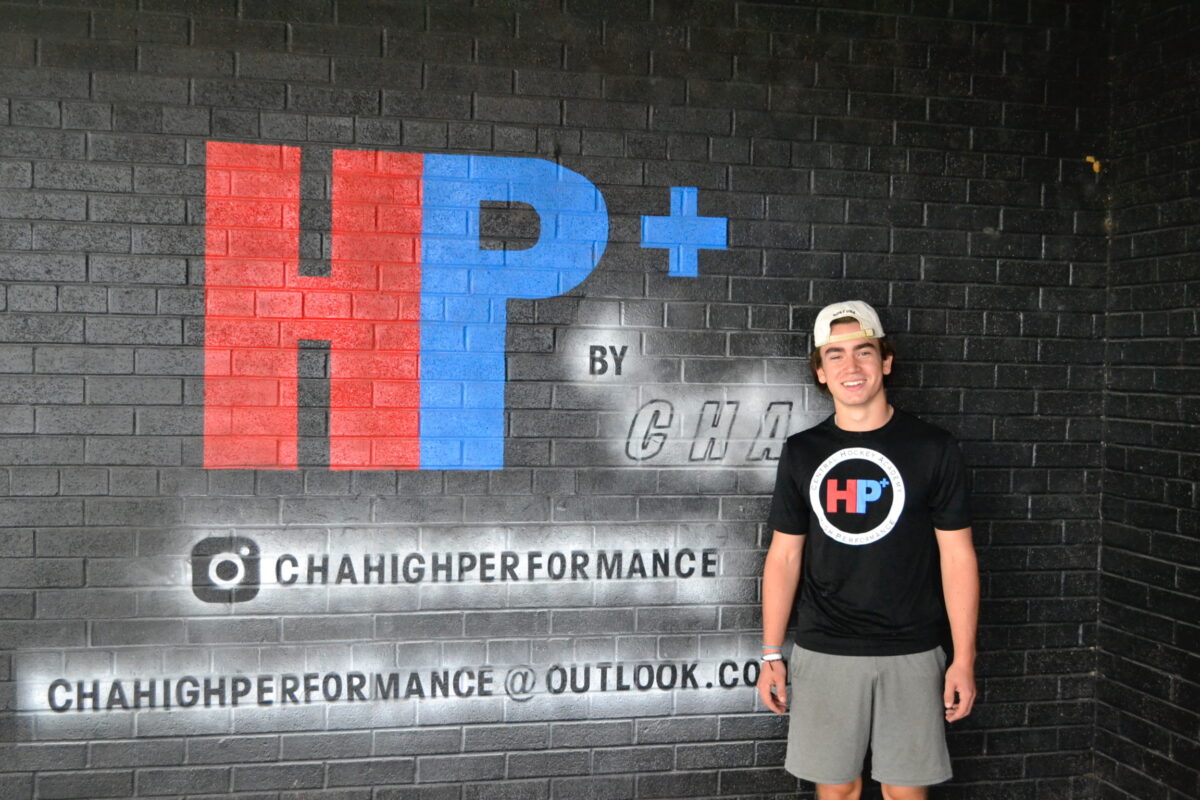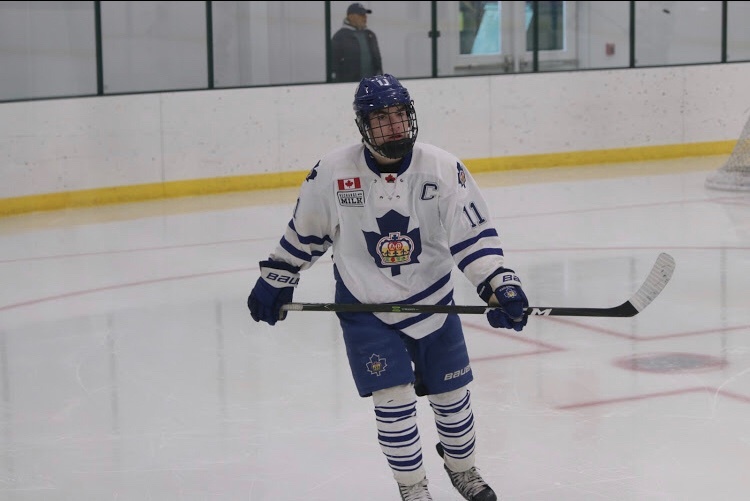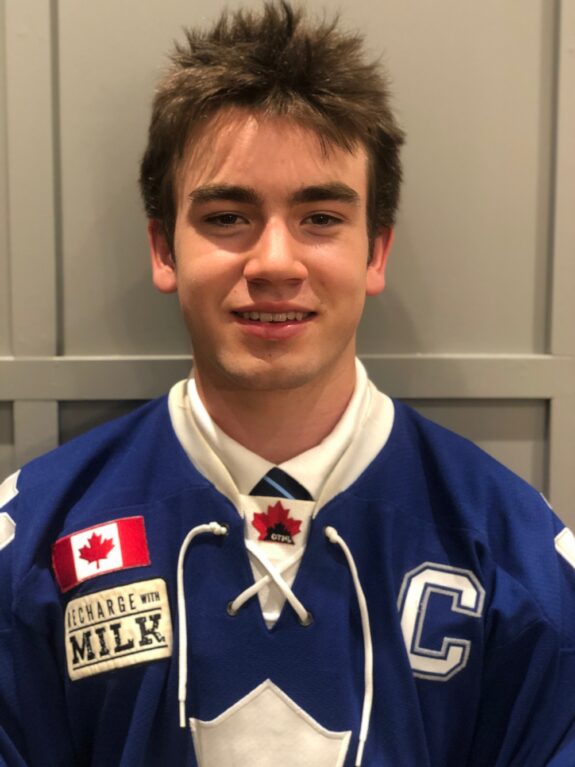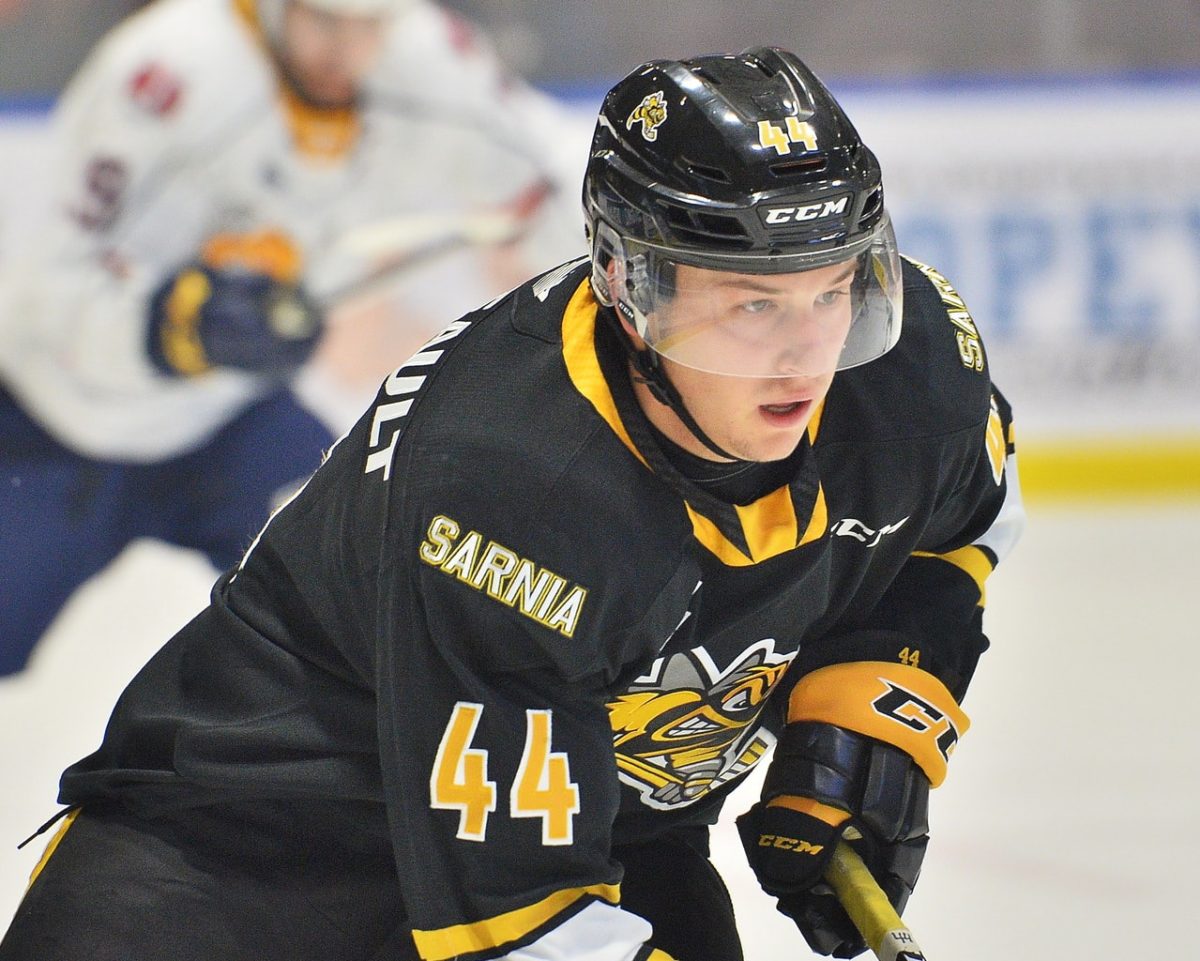Angus MacDonell feels his heartbeat. His knees are sore, and he’s sweating profusely. Still, he carries on. Surprisingly, he’s not at one of the many arenas scattered throughout the Greater Toronto Area. He’s not at the gym, where he’s continued to push himself off the ice. He’s at home, alone, shooting pucks in his backyard. A perfect representation of what the past year has been like for so many young athletes.
A seven-year Greater Toronto Hockey League veteran, MacDonell has spent nearly his whole minor hockey career with the Toronto Marlboros, a prestigious organization that Charlie Conacher and Brad Park (among others) called home before their Hall of Fame careers. The team’s most recent alumni include John Tavares and Connor McDavid, who donned the Marlboros emblem.
It’s a quiet night west end of Toronto, a city that has produced countless iconic hockey characters and is home to many still aspiring to fulfill their NHL dream. In a normal summer, MacDonell would have been one of many young hockey players on the ice, anticipating the start of the season. However, as the pandemic continues to keep a firm grip on the limits of normal life, he’s been forced to adjust, a process that he’s taken in stride as the offseason rolls along.
“The pandemic definitely had a massive impact on my training and missing a whole year of hockey, it was tough,” MacDonell recalled. “But the good thing is that everyone in Ontario is at the same point. It’s impacted my training, but I’ve done everything I can to put myself at a place where I can make an impact at the next level.”
It may seem like a simple response to a question about the pandemic, but McDonell’s mentality, both on and off the ice, continues to bring him success in the upper echelons of the sport.

The GTHL, older than the NHL itself, is a beacon for elite minor hockey talent in North America. Many of the league’s alumni go on to be drafted into the OHL, and plenty find their way into collegiate programs across the United States. Both paths are a direct route to the NHL, which is familiar to MacDonell.
“It’s probably the best minor hockey league in North America if not the world. You’re playing against the best guys in the province, both in games and in practices,” said MacDonell, thinking back fondly of his time in the GTHL. “It just goes to show how great a development program the Toronto Marlboros and the GTHL is and that’s why you see so many GTHL guys get drafted into the OHL.”
Capturing a pair of GTHL Championships during his tenure and spending the last three seasons as captain, MacDonell was drafted 13th overall by the Sarnia Sting in the 2021 OHL Draft, which he credits to the Marlboros organization.
“I think I’ve definitely been placed in a great environment, not only at home with my parents and family members, but also with the Marlboros. Inside that organization is definitely where you want to be, they push you to be better,” he continued, praising his minor hockey league team for the winning culture they’ve established. “Having such great players and even better people in that dressing room helped me get better. It just goes to show how great of a team we’ve had and how there’s going to be a lot of guys finding success at the next level.”
“To have a great family who keep pushing me to get better, to have great teammates and coaches who keep pushing me to get better, that really helped me improve and succeed.”
Earning Your Letters
MacDonell was one of the top players on a star-studded U16 Marlboros roster. He and 14 of his teammates were drafted into the OHL in June, continuing the trend of elite hockey talent developed by the Marlboros program.
Describing himself as a “vocal leader”, he recalls the moment he was given the captaincy and the impact that it’s had on his career.
“I became the captain pretty young so it was definitely a wild moment for me. You’ve seen all the players who have worn the ‘C’ for the Marlboros organization before me so I took a lot of pride in that,” MacDonell says, still in awe of the players who’ve come before him. “It had a huge impact on myself and it took a lot on me to be the leader that it took to win championships.”
Having the ‘C’ on his sweater kickstarted MacDonell’s development and gave him a new mindset that he continues to carry with him through the roller coaster that is minor hockey.
“I pushed everyone and told them that they’re doing their job. But having such great players, and even better people in that dressing room, helped me get better. It just goes to show how great of a team we’ve had and how there’s going to be a lot of guys finding success at the next level.”

At the helm of the Marlboros minor bantam team is Richard Power, who has been behind the bench since Anaheim Ducks prospect Jamie Drysdale and New York Rangers draftee Will Cuylle were still household GTHL names. While he’ll be the first to admit that MacDonell brings a level of intensity to the rink that’s matched by few, he emphasized that how he views the game that truly gives him an advantage over his competitors.
“There’s never really a stop to him,” Power says, pausing slightly as if he was unsure how to define MacDonell’s character. “Angus is always trying to push the boundaries and it really comes from his work ethic. When push comes to shove, when the game’s on the line, our hardest working guy is Angus.”
Power also praised MacDonell’s leadership qualities, and how wearing the ‘C’ has worked wonders for his development. “Angus gets a feel for a dressing room and an arena very quickly. He knows what kind of game we’re entering and what the dressing room vibes are like,” Power continued. “When Angus really speaks, everyone listens.”
The coach ended our conversation with a nice summary of what MacDonell brings to the ice and the impact his mindset has had on not only the player but also his teammates:
“I’ve seen every team in North America and the respect Angus commands from his opponents is something else,” said Power, chuckling to himself at the irony; that respect can be found within competitive hockey. “Angus puts up goals just like every young superstar with elite status, but it’s the fact that he makes you earn everything. If you’re going to beat Angus or his team, you’re going to have to earn it, and that flows through Angus.”
Maintenance, Both On and Off the Ice
Valued leadership and unwavering commitment aren’t the only talents that come naturally to MacDonell. After potting 23 goals in 27 games during his 2019-20 campaign, the 16-year-old’s offensive capabilities are impossible to ignore. But goals can only get you so far. More and more, we’ve seen the mental aspect of sport being emphasized and how players carry themselves away from the rink. So, while MacDonell has an abundance of talent on the ice, he also values his intangibles away from the rink.

When asked about the key to his success, MacDonell was quick to point out his demeanour and his ability to stay calm through adversity. “My mental stability and mental toughness [has been my most important key to success],” he said confidently. “Mental toughness is something you have to have if you want to be a great athlete and that’s something that I think I do really well, to keep myself stable and keep my mind focused on the game.”
Many still believe that stats and skills are what carry a player forward. MacDonell proves that, while numbers do matter, what happens off the ice is just as important. Along with being an offensive threat, he’s a well-respected leader and looks after himself, determined to do the little things right.
His father, Brad, has had a front-row seat to MacDonell’s growth and development. He has been heavily involved in his son’s athletic career and has been critical to his success.
“I’ll always attribute my success to is my dad,” MacDonell said, pausing to appreciate the impact his father has had on his career. “Just having him by my side, at home and at the rink, everything he’s done for me to not only make me a great player but also a great person, he’s taught me a lot of great things and he’s definitely someone I can always reach out to.”
The elder MacDonell, who coached MacDonell in both hockey and lacrosse, echoed Power’s thoughts on what sets his son apart; a constant desire to improve, an awareness to maintain a consistent mindset, and a competitive edge that nobody else can replicate.

“Angus has always been open to trying anything that would help him to get better. He’s never just been focused on doing one thing to improve himself,” said Brad. “He’s taking a more broad approach to work on specific things. In the past, it was working hard in the winter in hockey and working hard in the summer in lacrosse but now the focus is on hockey.”
For his father, coaching and supporting a top OHL prospect certainly hasn’t been the easiest task, and the line between coaching and parenting can often become blurred in a competitive market like Toronto. Still, he maintains a balance between the two, which is more important than most people realize.
“I was involved in all the teams he was on, but I always made sure I was there as a coach and not as a parent,” Brad said, hesitating slightly at the question. “I tried not to interfere with him as a player, and I separated being a dad and a coach. I always made sure he was in a good situation, surrounded by good people and good coaches who had the right intentions.”
When the conversation shifted away from his role dual role, Brad didn’t hesitate to praise his son for what he’s doing right. “He’s always had a real competitive, killer instinct, and that’s been a real benefit to him. He’s a good skater, but I really think it’s his competitive spirit that really gives him an advantage,” said Brad. “There are so many good players around, and you really need something like that to succeed at the next level.”
Those final words offer a glimpse into what the hockey market looks like in Toronto. With countless talented players and plenty of teams to facilitate that talent, it’s become increasingly challenging for young players to stand out. But given MacDonell’s dedication to improving in all facets of life, he’s differentiated himself and raised his game to a new level.
Behind the Scenes
It’s been over two months since the OHL Draft, and MacDonell hasn’t stopped thinking about it, but in typical fashion, he stayed focused.
“I’ve been working my whole life towards the goal of playing in the OHL,” MacDonell revealed, thinking back to his earliest hockey memories. “It was a couple years ago that I started getting noticed, but I didn’t let it get to my head. I accepted that if I wanted to hear my name in those conversations, I was going to have put the work in.”
Humility is common in athletes. In fact, most professional players put other things ahead of personal accomplishments. It’s rare, however, for a young prospect on the brink of stardom to not only accept the attention he receives but to use it as motivation to become better. This is what truly defines the player and person that MacDonell has become.
“If you’re not going to put in the effort every hour of every day, you’re never going to get better,” says MacDonell, hinting at what began his progressive mentality. “There’s people all over the world that want to be in your position, and they’re working that much harder and getting better every single day. So, in order to be the best and to not have your spot taken, you have to be the hardest worker in the room.”
His attitude towards the sport and his rugged offensive ability is what attracted Sarnia Sting general manager Dylan Seca to MacDonell in the first place. The Sting had been searching for a player with his skillset to follow in the footsteps of Carolina Hurricanes prospect Jamieson Rees and complement Anaheim Ducks 2020 first-round pick, Jacob Perreault. MacDonell was aware of his chances of donning the black and gold.

“I had a lot of great talks with Sarnia, and they were probably the team I expected to go to. We got to the 13th pick, and we saw my name pop up, and everyone went crazy,” MacDonell recalled. “It was a crazy moment that I’ll never forget, and I took a lot of it in, but this is the summer where I have to put a lot of the work in and hope that I can contribute this season.”
“Angus was someone on our radar from our first viewing of him. He has a high skill level which is equally matched by his character which falls directly in line with our core values as an organization. He will be a player that our fans will love watching play for years to come.”
– Sarnia Sting General Manager Dylan Seca
While MacDonell did celebrate after the draft, he remains focused on putting in the work and continuing to improve. “I have to do the little things right, the things a lot of other players wouldn’t do,” he said. “If those little things will make me better than everyone else, then I’m going to do them.”
Noting that NHLers like Arizona Coyotes budding defenseman Jakob Chychrun and Tampa Bay Lightning captain Steven Stamkos have both gone through Sarnia’s program, MacDonell is looking forward to playing in the OHL.
“I’m really excited to get to work. Their development program in Sarnia is amazing,” he said, noting that he’s already been contacted by some of the players and superfans. “Next year I’ll be a 16-year-old playing against 19, 20-year-olds so it’s just going to be awesome for my development.”
A Good Player & A Better Person
In a city that countless NHL players continue to call home, a city where hockey is ingrained in the culture, it can be tough to stand out. However, MacDonell continues to blaze his own path, valuing the things that don’t show up on the scoresheet.
His coach sees that dedication translated to the ice and in the dressing room. His father, while balancing the responsibilities of being both a coach and a parent, has seen his son grow in and away from the rink. The Sting know the value in on-ice talent and off-ice character, and MacDonell himself understands that while his dedication has brought him success, many aspirations lie ahead.

So, while he’s shooting pucks in his backyard (for now), MacDonell is fully aware that he’s not just a kid from Toronto with a dream to play in the NHL. He understands that he’s on his way to fulfilling that dream by emphasizing his life away from the rink just as much as his life within it. As long as he does that, he’s confident that he’ll be all the better for it.
“There’s going to be a lot of bumps in the road, you’re not always going to succeed or get the results that you want, but if you keep persevering and doing extra things to get better, do it,” MacDonell said with a smile. “Do whatever it takes to make you better as a player and even better as a person.”
To hear more about MacDonell’s career, find the Get Your Head in the Game podcast on all major platforms.